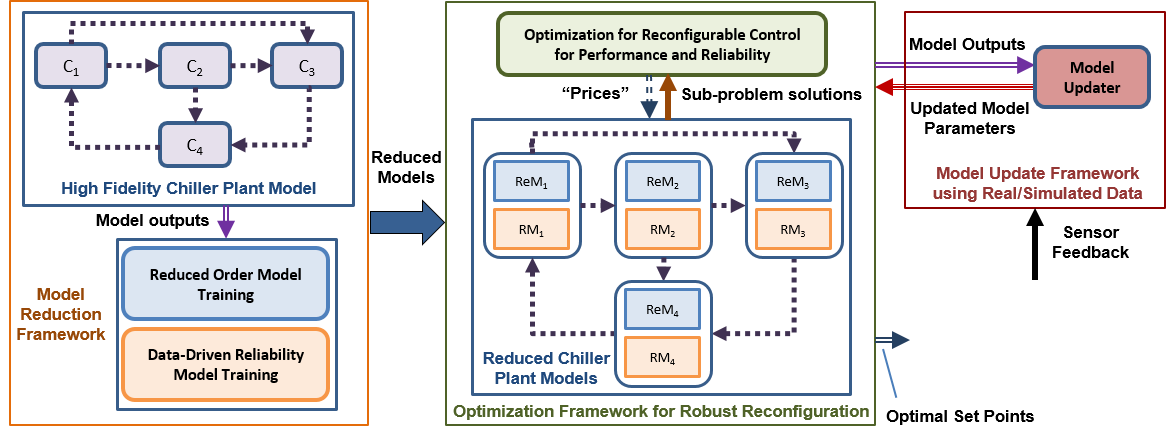Reconfigurable Chiller Plants for Performance
and Reliability

Principal Investigators
Shalabh Gupta
Graduate Fellows
Danxu Zhang, James Wilson, Khushboo Mittal
Co-Principal Investigator
Peter Luh
Project Duration
2018 - 2021
Project Summary
This project aims to develop a joint optimization method for performance and reliability of chiller plants in presence of faults. Performance optimization results in the selection of energy efficient set-points for the system. Adding reliability as an optimization objective achieves the desired system performance along with prolonged lifetime of the system and thus reduced maintenance and replacement costs. The developed optimization techniques will be robust to operating conditions such as different cooling load demands, weather uncertainties, etc. and scalable to different chiller plant configurations. Low complexity system models (data-driven and (or) physics-based) and statistical reliability models will also be developed to achieve real-time optimization. The performance and reliability feedback obtained from the above low complexity models will be used to determine the optimal set-points for system components to meet the performance in presence of faults while aiming to maximizing system reliability. The low complexity models will be periodically updated to account for component degradations and failures.
Program Applications
-CCS Chiller Plants
Expected Project Outputs
-A computationally efficient and scalable joint optimization method for performance and reliability of chiller plants
-Training 3 students towards their PhD
-Journal and conference publications
-Internship opportunities at CCS for students
Business Unit Engagement
-3 collaborators from CCS: Trevor Bailey, Hari Srinivasan, James Fan
Benefits to UTC Business Unit (CCS)
-Optimized chiller plants for performance and reliability achieving near-optimal performance with maximum reliability in an efficient and scalable way
-Data-driven and (or) physics-based reduced-order system models as well as reliability models for chiller plants
-Approach is translatable from one chiller plant to another, making deployment an easy task
Example Publications and Further Reading
-D. Zhang, P. Luh, J. Fan and S. Gupta, “Chiller Plant Operation Optimization with Input and Model Uncertainties”, 14th IEEE International Conference on Automation Science and Engineering (CASE 2018), Munich, Germany, August,(2018).
-D. Zhang, P. B. Luh, J. Fan and S. Gupta, "Chiller Plant Operation Optimization With Minimum Up/Down Time Constraints," in IEEE Robotics and Automation Letters, vol. 3, no. 1, pp. 9-15, Jan. 2018.
-D. Zhang, P. B. Luh, J. Fan and S. Gupta, "Chiller Plant Operation Optimization: Energy-Efficient Primary-Only and Primary–Secondary Systems," in IEEE Transactions on Automation Science and Engineering, vol. 15, no. 1, pp. 341-355, Jan. 2018.
-K. Mittal, J. P. Wilson, B. P. Baillie, S. Gupta, G. M. Bollas and P. B. Luh, "Supervisory Control for Resilient Chiller Plants Under Condenser Fouling," in IEEE Access, vol. 5, pp. 14028-14046, 2017.